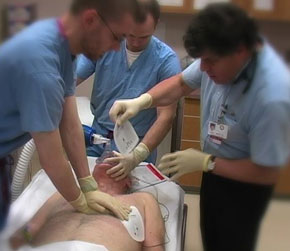Defibrillator Surgery
For those with heart conditions, there is a constant sense of worry about what could happen if their heart is worked too hard or in the wrong way. This is a normal feeling, as many people with heart conditions live their life on edge. The stress of living with a heart condition only works to make that condition worse. There are some tools that can help alleviate some of that stress. One is through defibrillator surgery, where an implantable defibrillator is inserted in the chest.
Another is through the insertion of a pacemaker. These are ways to ensure the heart keeps beating. They aren’t fail-proof, but they are a very effective way to possibly extend your life. If you are to the point where your doctor has recommended you have defibrillator surgery, you already have a heart condition and may have already had a heart attack at some point. This means at any moment you could have another. This fact shouldn’t scare you, but it should show you the importance of following your doctor’s advice to get defibrillator surgery. There are downsides to the implantable defibrillator, but they are far outweighed by the benefits.
What is Defibrillator Surgery?
When your doctor tells you he or she wants you to have defibrillator surgery, you may be a little confused as to what exactly it is. Defibrillator surgery is where a surgeon (or other qualified doctor) inserts an implantable defibrillator in your chest, with the “shocker” going near your right atrium, one of the four chambers of your heart. The heart tells itself to beat, supplying oxygen to all the cells of the body. When the heart gets damaged, sometimes the signal it sends itself can get disrupted. When this happens, a heart attack ensues. When this happens, a defibrillator can be used to send an electrical impulse to the heart, hopefully resetting the signal to start working correctly again.
Normally, a defibrillator is external and not inserted in the body. They are the machines that are seen on television shows that doctor use, while calling out “clear!” These have now been made to be inserted into the body, constantly monitoring the heart for any failure.
Getting Defibrillator Surgery
When you have decided to have defibrillator surgery, you will need to prepare for surgery. Your doctor should fill you in on any important details about your surgery, such as what you will eat before surgery. You may have to fast for a certain number of hours. This is for your safety to prevent possible sickness during and after the surgery.
Another issue involving defibrillator surgery is the cost. Implantable defibrillators are not cheap, so it is best to get the defibrillator surgery while you have insurance. They will most likely pay for this procedure, as it is a life-saving surgery. In the end, the defibrillator surgery is designed to save your life, so keep this in mind if you are aggravated as you go through the surgery and recovering from it. While it can be uncomfortable, you are working to save your heart and life!

